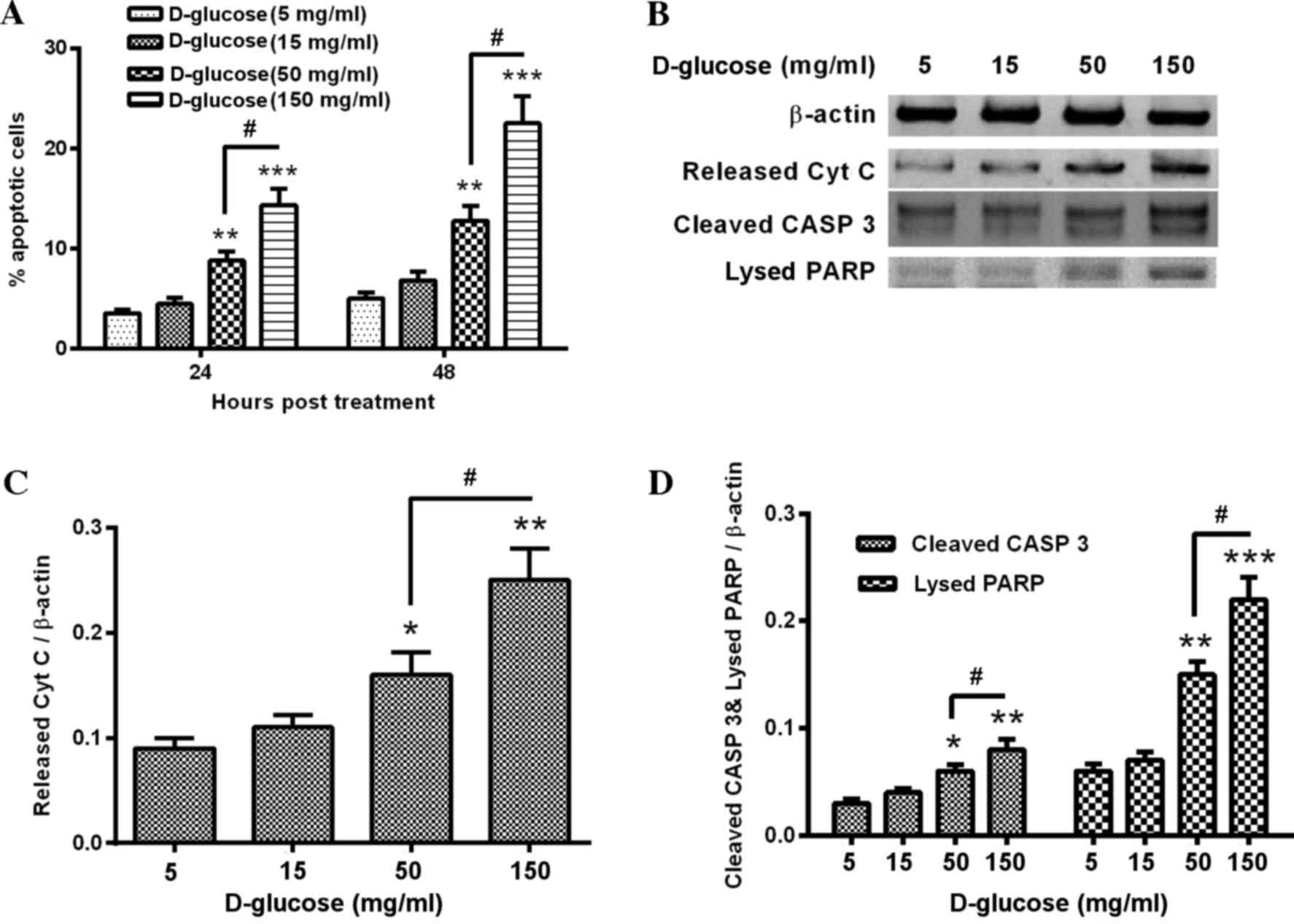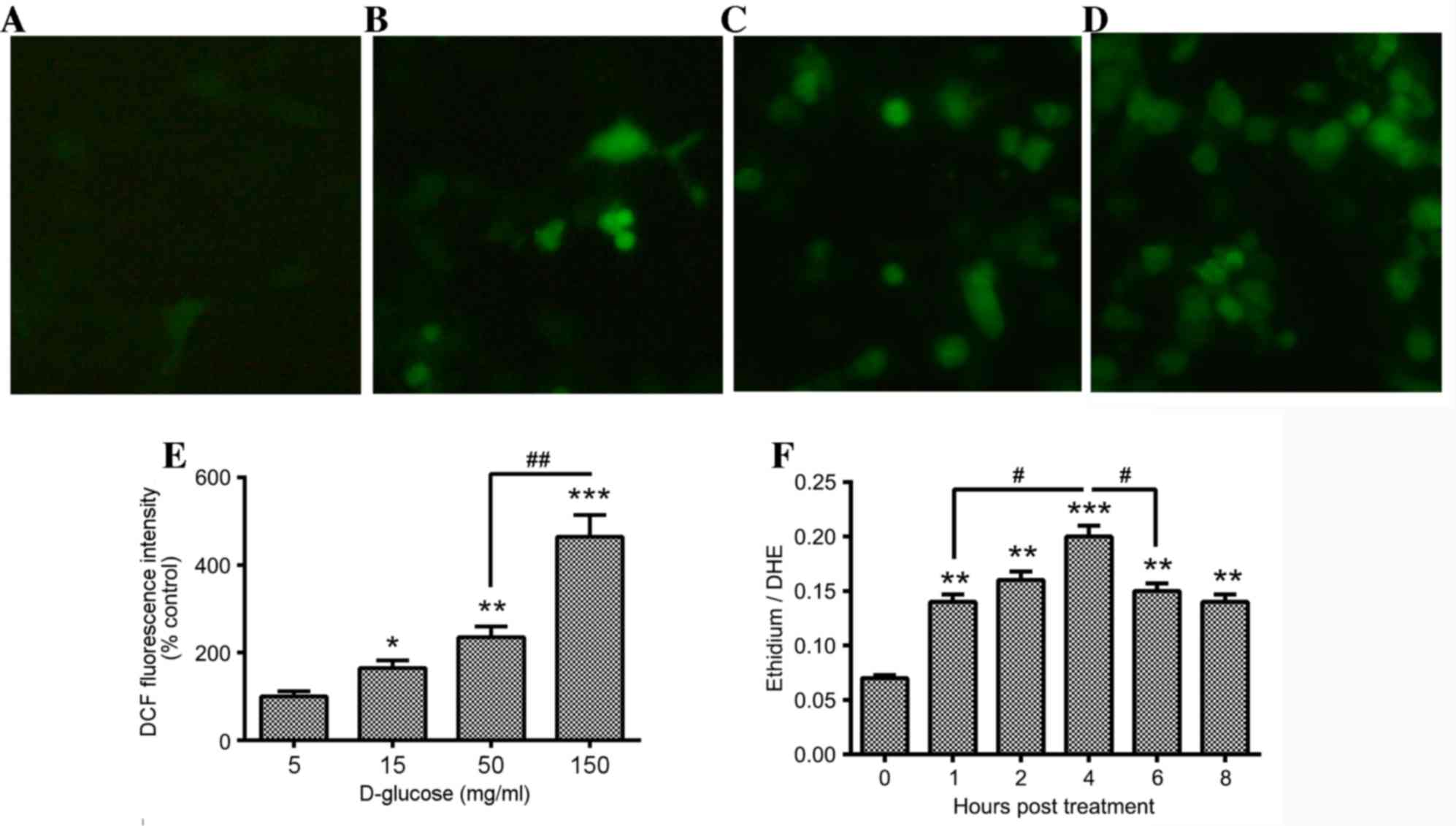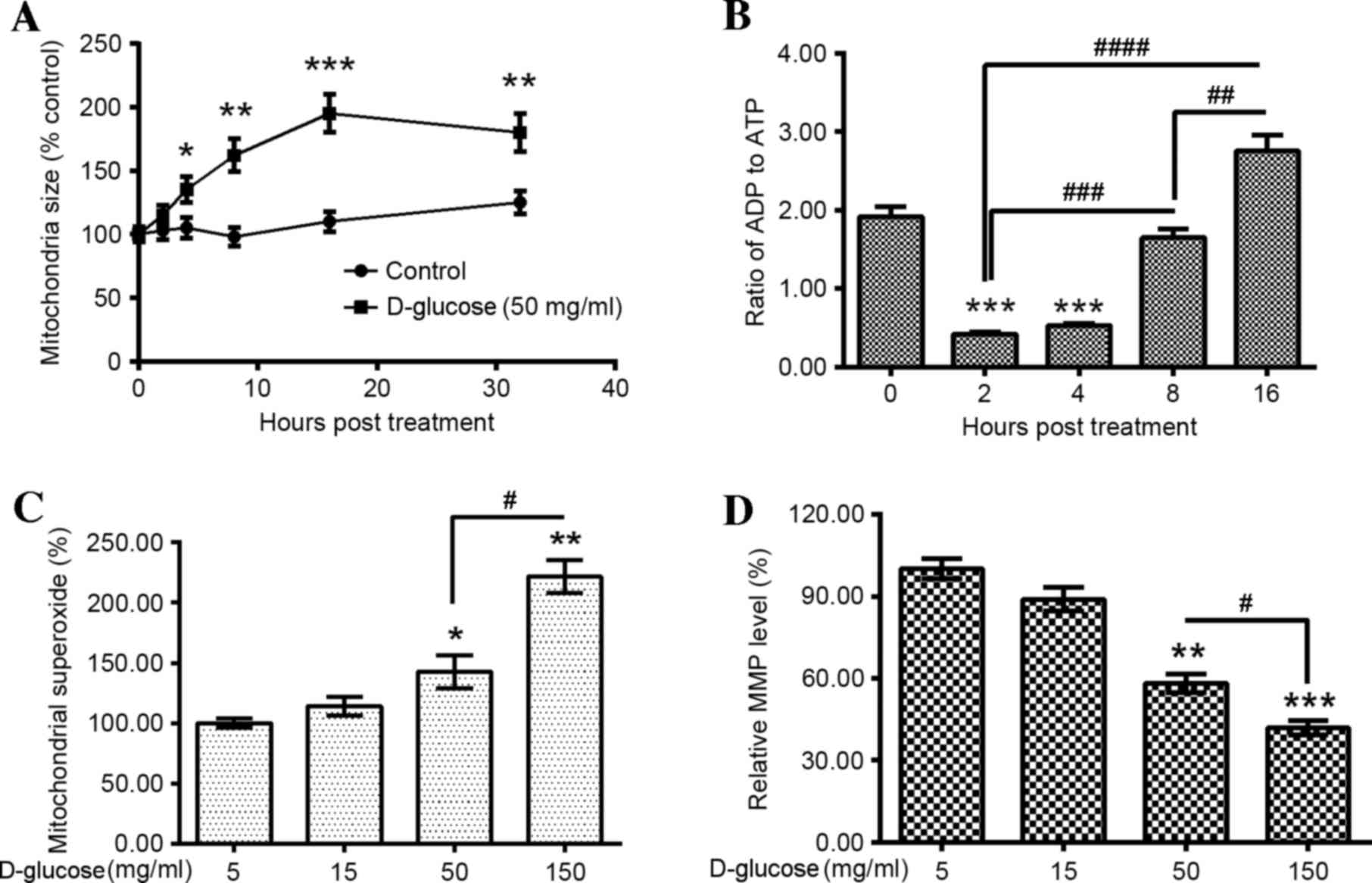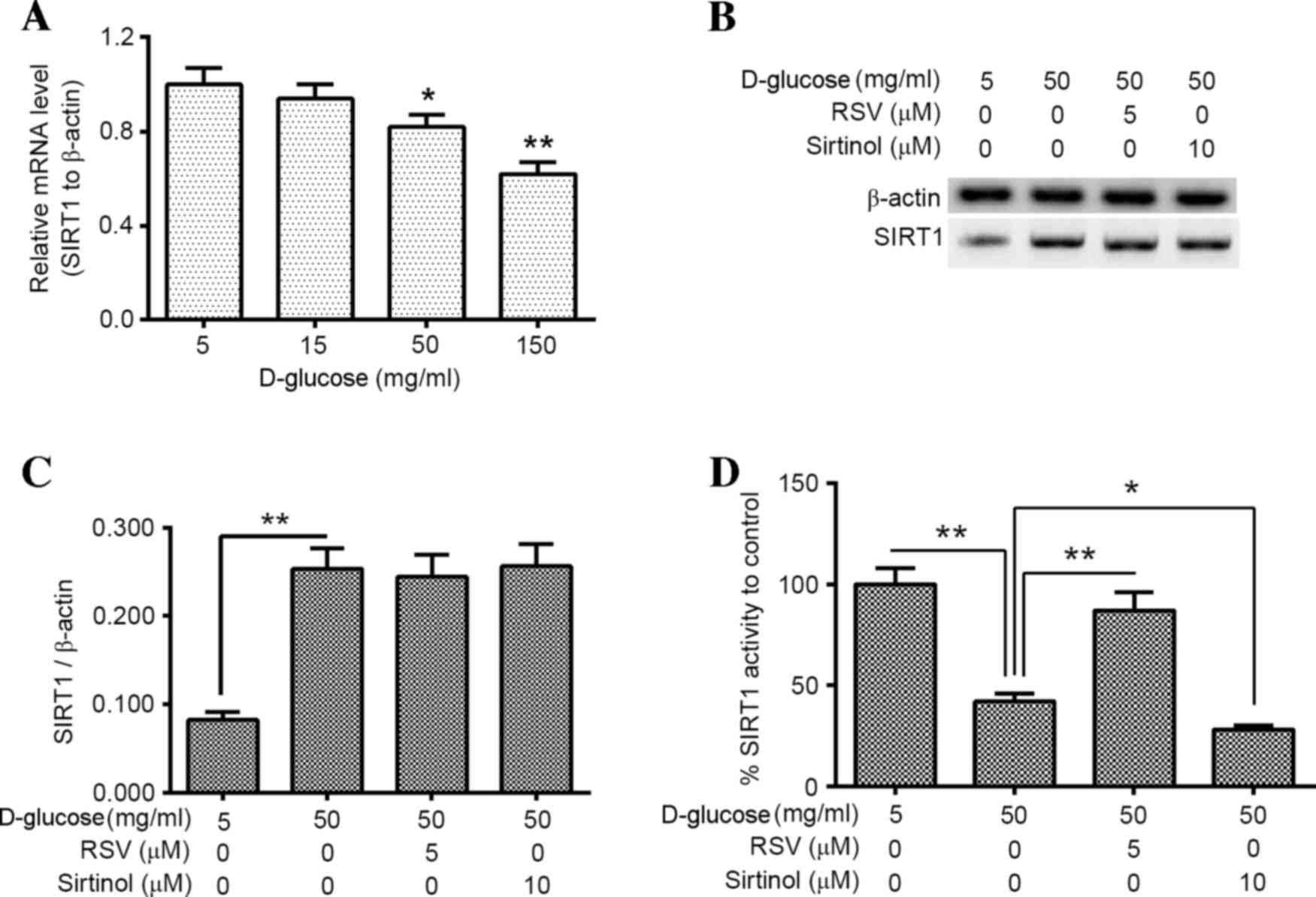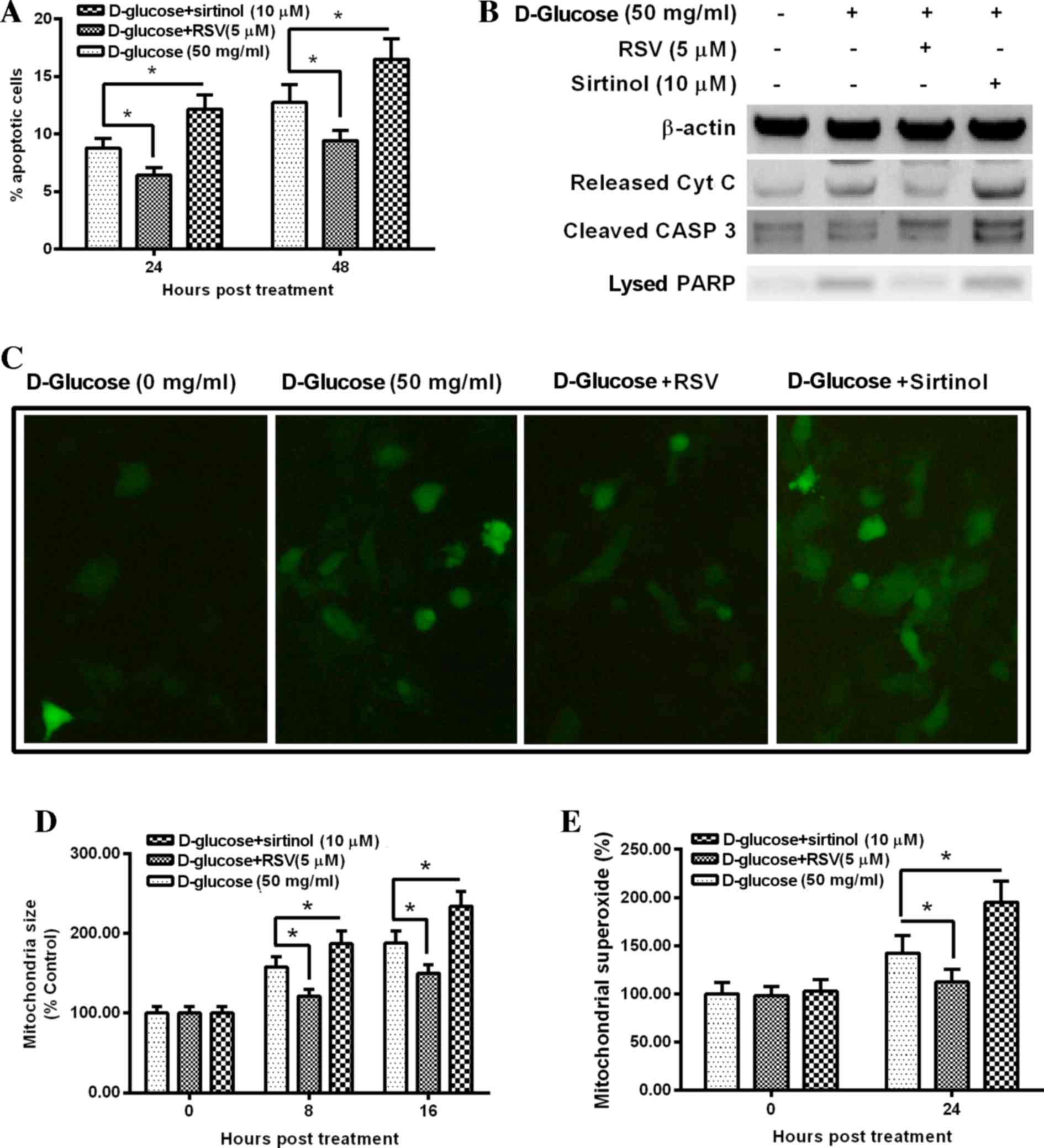|
1
|
Chen F, Qian LH, Deng B, Liu ZM, Zhao Y
and Le YY: Resveratrol protects vascular endothelial cells from
high glucose-induced apoptosis through inhibition of NADPH oxidase
activation-driven oxidative stress. CNS Neurosci Ther. 19:675–681.
2013. View Article : Google Scholar : PubMed/NCBI
|
|
2
|
Wang XM, Yao M, Liu SX, Hao J, Liu QJ and
Gao F: Interplay between the Notch and PI3K/Akt pathways in high
glucose-induced podocyte apoptosis. Am J Physiol Renal Physiol.
306:F205–F213. 2014. View Article : Google Scholar : PubMed/NCBI
|
|
3
|
Muto T, Tien T, Kim D, Sarthy VP and Roy
S: High glucose alters Cx43 expression and gap junction
intercellular communication in retinal Müller cells: Promotes
Müller cell and pericyte apoptosis. Invest Ophthalmol Vis Sci.
55:4327–4337. 2014. View Article : Google Scholar : PubMed/NCBI
|
|
4
|
Pan Y, Wang Y, Zhao Y, Peng K, Li W, Wang
Y, Zhang J, Zhou S, Liu Q, Li X, et al: Inhibition of JNK
phosphorylation by a novel curcumin analog prevents high
glucose-induced inflammation and apoptosis in cardiomyocytes and
the development of diabetic cardiomyopathy. Diabetes. 63:3497–3511.
2014. View Article : Google Scholar : PubMed/NCBI
|
|
5
|
Cave AC, Brewer AC, Narayanapanicker A,
Ray R, Grieve DJ, Walker S and Shah AM: NADPH oxidases in
cardiovascular health and disease. Antioxid Redox Signal.
8:691–728. 2006. View Article : Google Scholar : PubMed/NCBI
|
|
6
|
Du XL, Edelstein D, Rossetti L, Fantus IG,
Goldberg H, Ziyadeh F, Wu J and Brownlee M: Hyperglycemia-induced
mitochondrial superoxide overproduction activates the hexosamine
pathway and induces plasminogen activator inhibitor-1 expression by
increasing Sp1 glycosylation. Proc Natl Acad Sci USA.
97:12222–12226. 2000. View Article : Google Scholar : PubMed/NCBI
|
|
7
|
Nishikawa T, Edelstein D, Du XL, Yamagishi
S, Matsumura T, Kaneda Y, Yorek MA, Beebe D, Oates PJ, Hammes HP,
et al: Normalizing mitochondrial superoxide production blocks three
pathways of hyperglycaemic damage. Nature. 404:787–790. 2000.
View Article : Google Scholar : PubMed/NCBI
|
|
8
|
Zhang WF, Xu YY, Xu KP, Wu WH, Tan GS, Li
YJ and Hu CP: Inhibitory effect of selaginellin on high
glucose-induced apoptosis in differentiated PC12 cells: Role of
NADPH oxidase and LOX-1. Eur J Pharmacol. 694:60–68. 2012.
View Article : Google Scholar : PubMed/NCBI
|
|
9
|
Sachse A and Wolf G: Angiotensin
II-induced reactive oxygen species and the kidney. J Am Soc
Nephrol. 18:2439–2446. 2007. View Article : Google Scholar : PubMed/NCBI
|
|
10
|
Coppey LJ, Davidson EP, Rinehart TW,
Gellett JS, Oltman CL, Lund DD and Yorek MA: ACE inhibitor or
angiotensin II receptor antagonist attenuates diabetic neuropathy
in streptozotocin-induced diabetic rats. Diabetes. 55:341–348.
2006. View Article : Google Scholar : PubMed/NCBI
|
|
11
|
Hammes HP, Martin S, Federlin K, Geisen K
and Brownlee M: Aminoguanidine treatment inhibits the development
of experimental diabetic retinopathy. Proc Natl Acad Sci USA.
88:11555–11558. 1991. View Article : Google Scholar : PubMed/NCBI
|
|
12
|
Du Y, Miller CM and Kern TS: Hyperglycemia
increases mitochondrial superoxide in retina and retinal cells.
Free Radic Biol Med. 35:1491–1499. 2003. View Article : Google Scholar : PubMed/NCBI
|
|
13
|
Xia P, Inoguchi T, Kern TS, Engerman RL,
Oates PJ and King GL: Characterization of the mechanism for the
chronic activation of diacylglycerol-protein kinase C pathway in
diabetes and hypergalactosemia. Diabetes. 43:1122–1129. 1994.
View Article : Google Scholar : PubMed/NCBI
|
|
14
|
Koya D and King GL: Protein kinase C
activation and the development of diabetic complications. Diabetes.
47:859–866. 1998. View Article : Google Scholar : PubMed/NCBI
|
|
15
|
Nerlich AG, Sauer U, Kolm-Litty V, Wagner
E, Koch M and Schleicher ED: Expression of
glutamine:fructose-6-phosphate amidotransferase in human tissues:
Evidence for high variability and distinct regulation in diabetes.
Diabetes. 47:170–178. 1998. View Article : Google Scholar : PubMed/NCBI
|
|
16
|
Perez-Matute P, Zulet MA and Martinez JA:
Reactive species and diabetes: Counteracting oxidative stress to
improve health. Curr Opin Pharmacol. 9:771–779. 2009. View Article : Google Scholar : PubMed/NCBI
|
|
17
|
Qin X, Zhang Z, Xu H and Wu Y: Notch
signaling protects retina from nuclear factor-κB- and
poly-ADP-ribose-polymerase-mediated apoptosis under high-glucose
stimulation. Acta Biochim Biophys Sin (Shanghai). 43:703–711. 2011.
View Article : Google Scholar : PubMed/NCBI
|
|
18
|
Zhang Q and Steinle JJ: DNA-PK
phosphorylation of IGFBP-3 is required to prevent apoptosis in
retinal endothelial cells cultured in high glucose. Invest
Ophthalmol Vis Sci. 54:3052–3057. 2013. View Article : Google Scholar : PubMed/NCBI
|
|
19
|
He M, Nitti M, Piras S, Furfaro AL,
Traverso N, Pronzato MA and Mann GE: Heme oxygenase-1-derived
bilirubin protects endothelial cells against high glucose-induced
damage. Free Radic Biol Med. 89:91–98. 2015. View Article : Google Scholar : PubMed/NCBI
|
|
20
|
He S, Zhang J, Qi X, Wang D, Wang X and
Zhou S: Neuregulin protects human umbilical vein endothelial cell
via activating CD98hc through MAPK pathway. Int J Clin Exp Med.
8:6702–6712. 2015.PubMed/NCBI
|
|
21
|
Zhang Y, Liu J, Luo JY, Tian XY, Cheang
WS, Xu J, Lau CW, Wang L, Wong WT, Wong CM, et al: Upregulation of
angiotensin (1–7)-mediated signaling preserves endothelial function
through reducing oxidative stress in diabetes. Antioxid Redox
Signal. 23:880–892. 2015. View Article : Google Scholar : PubMed/NCBI
|
|
22
|
Wang R, Lu L, Guo Y, Lin F, Chen H, Chen W
and Chen M: Effect of glucagon-like peptide-1 on
high-glucose-induced oxidative stress and cell apoptosis in human
endothelial cells and its underlying mechanism. J Cardiovasc
Pharmacol. 66:135–140. 2015. View Article : Google Scholar : PubMed/NCBI
|
|
23
|
Chen YR, Lai YL, Lin SD, Li XT, Fu YC and
Xu WC: SIRT1 interacts with metabolic transcriptional factors in
the pancreas of insulin-resistant and calorie-restricted rats. Mol
Biol Rep. 40:3373–3380. 2013. View Article : Google Scholar : PubMed/NCBI
|
|
24
|
Gerhart-Hines Z, Rodgers JT, Bare O, Lerin
C, Kim SH, Mostoslavsky R, Alt FW, Wu Z and Puigserver P: Metabolic
control of muscle mitochondrial function and fatty acid oxidation
through SIRT1/PGC-1alpha. EMBO J. 26:1913–1923. 2007. View Article : Google Scholar : PubMed/NCBI
|
|
25
|
Schmittgen TD and Livak KJ: Analyzing
real-time PCR data by the comparative C(T) method. Nat Protoc.
3:1101–1108. 2008. View Article : Google Scholar : PubMed/NCBI
|
|
26
|
Duan J, Wei G, Guo C, Cui J, Yan J, Yin Y,
Guan Y, Weng Y, Zhu Y, Wu X, et al: Aralia taibaiensis protects
cardiac myocytes against high glucose-induced oxidative stress and
apoptosis. Am J Chin Med. 43:1159–1175. 2015. View Article : Google Scholar : PubMed/NCBI
|
|
27
|
Zhao H, Ma T, Fan B, Yang L, Han C, Luo J
and Kong L: Protective effect of trans-δ-viniferin against high
glucose-induced oxidative stress in human umbilical vein
endothelial cells through the SIRT1 pathway. Free Radic Res.
50:68–83. 2016. View Article : Google Scholar : PubMed/NCBI
|
|
28
|
Jiang X, Tang X, Zhang P, Liu G and Guo H:
Cyanidin-3-O-β-glucoside protects primary mouse hepatocytes against
high glucose-induced apoptosis by modulating mitochondrial
dysfunction and the PI3K/Akt pathway. Biochem Pharmacol.
90:135–144. 2014. View Article : Google Scholar : PubMed/NCBI
|
|
29
|
Xu Z, Zhang L, Li X, Jiang Z, Sun L, Zhao
G, Zhou G, Zhang H, Shang J and Wang T: Mitochondrial
fusion/fission process involved in the improvement of catalpol on
high glucose-induced hepatic mitochondrial dysfunction. Acta
Biochim Biophys Sin (Shanghai). 47:730–740. 2015. View Article : Google Scholar : PubMed/NCBI
|
|
30
|
Zhang HH, Ma XJ, Wu LN, Zhao YY, Zhang PY,
Zhang YH, Shao MW, Liu F, Li F and Qin GJ: SIRT1 attenuates high
glucose-induced insulin resistance via reducing mitochondrial
dysfunction in skeletal muscle cells. Exp Biol Med (Maywood).
240:557–565. 2015. View Article : Google Scholar : PubMed/NCBI
|
|
31
|
Zhang M, Niu X, Hu J, Yuan Y, Sun S, Wang
J, Yu W, Wang C, Sun D and Wang H: Lin28a protects against
hypoxia/reoxygenation induced cardiomyocytes apoptosis by
alleviating mitochondrial dysfunction under high glucose/high fat
conditions. PLoS One. 9:e1105802014. View Article : Google Scholar : PubMed/NCBI
|
|
32
|
Huang H and Wu K, You Q, Huang R, Li S and
Wu K: Naringin inhibits high glucose-induced cardiomyocyte
apoptosis by attenuating mitochondrial dysfunction and modulating
the activation of the p38 signaling pathway. Int J Mol Med.
32:396–402. 2013.PubMed/NCBI
|
|
33
|
Roy S, Trudeau K, Roy S, Tien T and
Barrette KF: Mitochondrial dysfunction and endoplasmic reticulum
stress in diabetic retinopathy: Mechanistic insights into high
glucose-induced retinal cell death. Curr Clin Pharmacol. 8:278–284.
2013. View Article : Google Scholar : PubMed/NCBI
|
|
34
|
Munusamy S and MacMillan-Crow LA:
Mitochondrial superoxide plays a crucial role in the development of
mitochondrial dysfunction during high glucose exposure in rat renal
proximal tubular cells. Free Radic Biol Med. 46:1149–1157. 2009.
View Article : Google Scholar : PubMed/NCBI
|
|
35
|
Bordone L and Guarente L: Calorie
restriction, SIRT1 and metabolism: Understanding longevity. Nat Rev
Mol Cell Biol. 6:298–305. 2005. View
Article : Google Scholar : PubMed/NCBI
|
|
36
|
Potente M, Ghaeni L, Baldessari D,
Mostoslavsky R, Rossig L, Dequiedt F, Haendeler J, Mione M, Dejana
E, Alt FW, et al: SIRT1 controls endothelial angiogenic functions
during vascular growth. Genes Dev. 21:2644–2658. 2007. View Article : Google Scholar : PubMed/NCBI
|
|
37
|
Chen LL, Zhang HH, Zheng J, Hu X, Kong W,
Hu D, Wang SX and Zhang P: Resveratrol attenuates high-fat
diet-induced insulin resistance by influencing skeletal muscle
lipid transport and subsarcolemmal mitochondrial β-oxidation.
Metabolism. 60:1598–1609. 2011. View Article : Google Scholar : PubMed/NCBI
|















